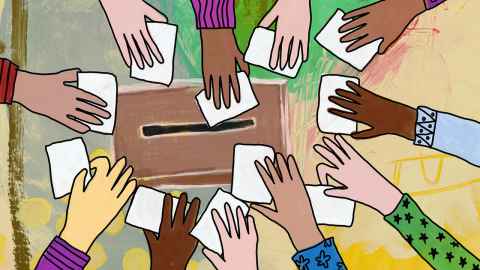Amid doubt and uncertainty, democracy slips
13 January 2025
Opinion: Scrutinising even the smallest changes on either side of the political spectrum is crucial in protecting democracy, writes doctoral candidate Joshua Greenwood.

Opinion: We often think of democracy as, at the very least, a one vote per person system where we collectively choose our leaders. This is fundamental, but many modern democracies also have a range of checks and balances, limit government power and ensure civil rights to protect a democracy from individuals and from itself. These democracies are typically described as liberal democracies, including New Zealand’s. But events happening here and internationally have led to many asking: where are democracies heading?
Democratic backsliding
Many argue that a number of countries face a phenomenon known as democratic backsliding, which is when limits on power or constraints on accountability in a democracy are undermined. This might involve undermining institutions like the courts, media or public agencies. Otherwise, leaders might also go against norms – behaviours we expect from leaders, creating a new normal that works in their favour.
Last century, breakdowns in democracy were sudden and typically the result of coups, revolutions or large election fraud, making them easy to spot and incite protests.
However, political and economic commentators now talk about a backsliding that is more ambiguous, gradual and incumbent-driven.
What does this trend look like? Incumbents increasingly exploiting existing powers, keeping within the law for appearances and making persuasive arguments to justify each step they take. This might involve governments removing regulations for ‘efficiency benefits’, undermining trust in media with claims about ‘fake news’, cutting public services or stacking it with political appointments to manage bureaucracy, or casting doubt on the integrity of elections.
Since arguments can be correct and actions well-intentioned, each ambiguous action that does intend to undermine democratic standards can pass unnoticed (or without enough backlash) while obscuring a more deliberate attempt to slowly erode the norms we’d expect of a strong democracy.
Small, justified and incremental changes in the legislature, media or government powers and behaviours can also erode the principles of a democracy without the sudden or obvious breaking points that elicit public attention and protest, as would a coup or obvious voter fraud. Backsliding thrives in uncertainty. Since governments might justify these changes as in our collective interest, how can we know when their intentions are otherwise?
Media scrutiny helps since it can capture the wider picture by connecting a series of backsliding actions to show a concerning trend or by questioning a leader’s arguments.
But in some cases, as in the United States, mistrust in media has made their role harder and, in turn, made it easier for incumbents to conceal their intentions. The narrative stays in the incumbent’s favour because media and people’s beliefs are divided; doubt and uncertainty foster conditions ripe for the erosion of democratic standards.

Our own confirmation and ideological biases play a role in democratic backsliding too. It’s reasonable to hold onto stances we’ve gradually formed from experience, but when beliefs become too rigid, they can cloud our view of what’s going on. We might tolerate less trustworthy leaders just because they align with our political opinions or because we don’t like the alternative.
When there are large problems in a society, like inequality, populist movements can also pit ‘the people’ against those in power (often in opposition to a perceived ‘elite’), so leaders can get the support they need to pursue reforms which can strike at the heart of a democracy with uncertain consequences.
Trial and error
My research investigates how leaders in pursuit of democratic backsliding test their limits by trial and error. They make predictions about how institutions and opposition might respond to their actions, and take a gamble, or a calculated risk. They will wager how scrutinising media will be and if they are, if the public will believe them.
By seeing how far they can push the envelope, they adjust their strategy after each success or failure. Incumbents know that actions can backfire, when an outcome is ‘good enough’ and the risks of pushing further.
Alternatively, they can backtrack to ease the public’s concerns – often just enough to ease backlash without sacrificing too much of their ambition.
New Zealand
New Zealand ranks highly in democratic indices, but we aren’t without ambiguity and/or a lack of wide consensus about intentions when it comes to democratic standards – even if our local examples of democratic backsliding are less extreme than some cases overseas, and regardless of whichever side is right about its consequences. Every democracy manifests its own challenges in different forms.
Consider the Fast-Track Approvals Bill. Proponents argue it will streamline significant developments as part of the wider RMA reforms. Opponents claim that giving individual ministers a final say without the checks from some previous legislation and sufficient consultations with iwi will produce undemocratic outcomes.
The Government backtracked on parts of the Bill to instead give an expert panel rather than ministers the final say. But, since the expert panel remains government-chosen, there is still ambiguity about its lasting impact on our democratic practice.
The Treaty Principles Bill is similar. Critics argue its principles are redefined in an undemocratic way, reducing commitments to Māori and undermining the Treaty. Supporters, meanwhile, suggest that the Bill promotes democracy by making the principles concrete therefore avoiding what they believe are unequal obligations.
No matter who we vote for, we’ve reached an agreement that democracy is nice to have – or is at least preferable to the other options. At the same time, we can’t take democracy for granted. Democracy has taken a long time to get here, faces novel challenges, and in many countries it’s still a new and fragile development.
Protecting democratic standards and norms once meant protesting sudden and obvious breakdowns in democracies, but we now need to be alert to trends, ambiguity and justifications for actions with uncertain intentions and consequences.
For this reason, we must also be willing to scrutinise the parties we vote for, build bi-partisan understanding and maintain a healthy scepticism about the decisions of our elected officials. It’s important to know that the quality of democracies increasingly moves as results of subtle incremental steps rather than attention-grabbing radical changes.
Institutions, like an opposition, courts, media and public agencies go a long way towards making attempts that undermine them risky, so that incumbents might be deterred from trying. But, if incumbents are willing enough, there will always be ways to test the limits of their powers. That’s why it often comes down to the public to decide what will and won’t be tolerated.
Whether we’re in an undermined democracy like Hungary, a challenged democracy like the United States or even one of the strongest democracies, as we are in New Zealand, it’s up to us to be alert to and scrutinise even the smallest changes on either side of the political spectrum that could shape our democratic practice for better or for worse.
Joshua Greenwood is a doctoral candidate in economics at the University of Auckland Business School.
This article reflects the opinion of the author and not necessarily the views of Waipapa Taumata Rau University of Auckland.
This article was first published on Newsroom.
Media contact:
Sophie Boladeras, media adviser
M: 022 4600 388
E: sophie.boladeras@auckland.ac.nz